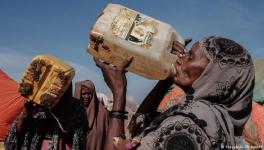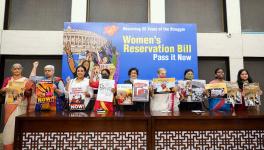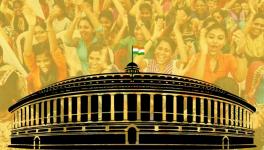Somalia: Women Struggle to Make Their Voices Heard in Politics
Women still represent a minority in Somalia's parliament
It's not easy being a female politician in conflict-ridden Somalia.
Men have long dominated national and local leadership roles in the Horn of Africa nation, largely due to deeply ingrained traditional prejudices.
Somalia has established a 30% seat quota for female lawmakers. But the Somali Women Association has accused regional clan presidents of overlooking or turning down potential candidates, leaving the quota unfilled.
Amino Dhurow knows this struggle all too well. The Mogadishu-based politician is also disabled and says discrimination looms large in Somali society — even though the country's provisional constitution includes measures intended to protect women seeking roles within the government.
"I am one of many Somali women with disabilities and I advocate for the rights of people with disabilities," Dhurow told DW. "I tried my best to run for a seat in the ongoing parliamentary elections. I hoped to quality and get support from other Somali women."
Fawzia Yusuf H. Adam (center) broke barriers to become Somalia's first female Minister of Foreign Affairs and Deputy Prime Minister — but its a difficult path for many
But things didn't go to plan.
"Unfortunately it did not happen because I was rejected by my clan elders who refused to allow me to represent them in parliament," she explains. "This means that women with disabilities have no political representation at all and we are not even part of the 30% quota. This is discrimination and inhuman.
Overcoming traditional barriers
Dhurow's experience isn't unique in Somalia, where the clan-dominated system makes it very difficult for women to succeed in politics.
In Somalia's conservative society, both men and women with disabilities are also generally viewed as powerless and unfit to hold such positions.
And despite often being the primary income providers, women are typically marginalized from the decision-making processes of their communities. For many, these cultural and social barriers mean their political dreams end before they even have a chance to begin.
Amina Mohamed Abdi was killed in a bomb attack in March while campaigning for re-election
Some do forge ahead despite the odds: Amina Mohamed Abdi — one of the Somali government's most vocal critics — won her first seat in parliament in 2012 at the age of 24. She repeatedly defied clan elders throughout her political career and repeatedly accused authorities of trying to stop her from running.
Abdi was tragically killed on March 23 in a series of bomb attacks claimed by militant group al-Shabaab while campaigning in rural Somalia ahead of long-delayed parliamentary elections.
Women's participation a 'fundamental issue'
For young Somali women determined to make a difference, change begins with better representation of women in the executive branch of the government.
"Women's political participation is a fundamental issue," political science graduate Hamdi Adam told DW. "Our constitution protects women's direct engagement in public decision-making and maintaining equal rights in a positive way which shapes democracy and good governance. Women should be strongly motivated to [pursue] more political participation."
Women in Somalia are fighting for greater freedoms in all areas of society
Only four women hold ministerial positions within Somalia's current federal government, while 14 women hold seats on the upper house and 51 in the lower house.
Somalia's Minister for Women and Human Rights Development, Hanifa Mohamed Ibrahim, says these numbers need to increase amid ongoing elections in the country.
"Previously we had 67 seats in the lower house and we know that 20 more seats in the house are yet to be elected, so we are looking to have our share," she told DW.
"As women in Somali politics, we have to move our agenda forward and get more political representation in all sectors of the government."
Edited by: Benita van Eyssen
Get the latest reports & analysis with people's perspective on Protests, movements & deep analytical videos, discussions of the current affairs in your Telegram app. Subscribe to NewsClick's Telegram channel & get Real-Time updates on stories, as they get published on our website.



























